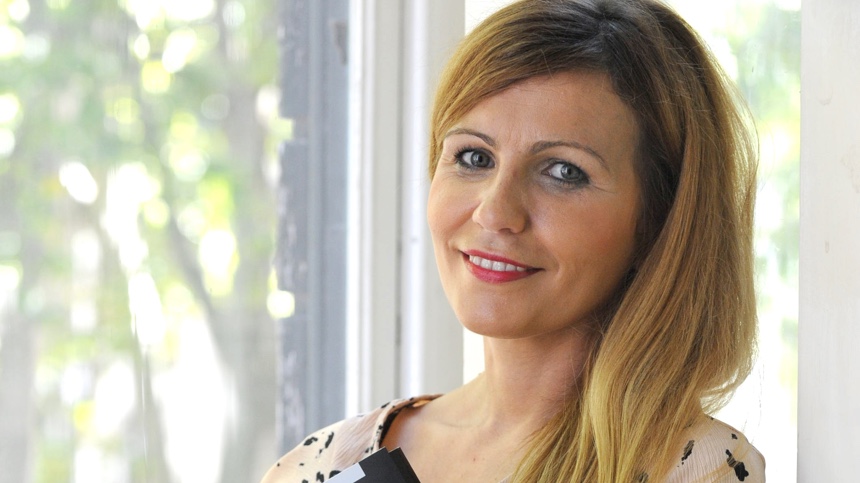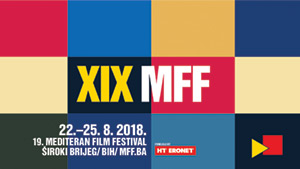
23/08/2018
It's a good to have many female directors at the Festival
For the first time, a woman comes to the forefront of one of the oldest documentary and short film festivals in Europe - the ZINEBI festival. Spanish filmmaker Vanesa Fernandez Guerra, besides the the festival's engagement, lectures at the University of Barcelona, and at the 19th Mediterranean Film Festival will be one of the three who will decide on the best feature documentary film. You are a jury member of this year's edition of the Mediterranean Film Festival. How would you rate the competition programme?
From my point of view it is a good selection and competition, high quality films are in the line up and this is wonderful for the festival. And on the other hand, there are so many women as filmmakers and producers and it´s so important as well.
You work as a lecturer at the University del Pais Vasco and Master studies in Creative Documentary at UAB Barcelona. What is it like to collaborate with the students, what is their focus on today?
For me it is really satisfactory because I work with them in the development of the documentary projects. You try to teach different ways to approach the film and then you see all the evolution of the films until they have a World Première of the film in an international film festival.
You also work as a researcher in the field of contemporary documentary film, what does it centre on?
Yes, our interest in this field is focused mainly in Spanish Contemporary documentary filmmaking and I work with researchers from all universities in Spain, especially from UAB (Barcelona). I am the director of the research project called Territorios y Fronteras (“Territories and frontiers”) and it has become really relevant in Spain. We organize as well a seminar with researchers, directors, producers and students and we edit book about Spanish documentary filmmakers.
Women have been governing your country since recently. That is, for the first time in the Government of Spain women have taken over 11 ministries. Is there any difference seen?
Yes, I am really happy with that. At film festivals and also at other public institutions (museums, art centres, university..) women have more power but we still have a long way to go…
For the first time a woman has taken the head position of one of the oldest festivals of documentary and short film in Europe – ZINEBI Festival. Namely, you have become the directress of this festival, what are the challenges you have been facing the most?
Yes, I am the first woman and I am so proud of that. The majority of my team are woman as well. It is not so easy because cinema is still a world for men (directing, producing, programming…) and sometimes you have to show that we are so competent also and that we have a different way to see the world.
There are seven female directors and three male directors of the films in MFF competition programme. Also, in the MFF jury, which you are a part of, there are three women and one man. This year's edition of the Cannes Film Festival as well has given plenty of space to women and their struggle for equality in the world of film, not to talk about Hollywood… What is your comment on all this, are there any changes happening, or is it just an illusion?
I am really optimistic with that!! But… we don´t have to forget that
some changes have to happen: more money for women directors and producers, more
female directors in our festivals, more female directors in the press… We have
to continue struggling until we get the real equality!! Governments should
change some measures to change the situation, as it happened in Sweden.
What is it like to be a woman in the world of film in Spain, have you ever felt any inabilities due to this fact?
For me in Spain it is harder, to be a woman in the world of film or to be an engineer woman or a businesswoman… With new generations it doesn´t happen but with people from other generations, they don´t legitimise women´s work, they still think that we are not good in our jobs or positions. Because of that I think that it is so important to manifest and demonstrate that “the present and the future are female”.
Spanish cinematography is quite productive, and in our applications and final official competition we have the greatest number of documentaries from your country. What do you think is the reason for that, how does the Spanish Government stimulate the film industry?
There are two reasons from my point of view. First, the university and the studies related to cinema, specially the Master on Documentary Filmmaking of University of Barcelona (UAB), they make such a good work!! And on the other hand, that is because regional and central Governments stimulate the film industry and in a way especially documentary filmmaking.
In your opinion, what is crucial for one country to have a quality and productive industry?
Governments’ economical stimulation for sure (local, regional, central, EU…), TV support and other institutions’ support to encourage quality industry, international coproduction… And of course, good education and tools to enhance new publics.
What is it like to be a woman in the world of film in Spain, have you ever felt any inabilities due to this fact?
For me in Spain it is harder, to be a woman in the world of film or to be an engineer woman or a businesswoman… With new generations it doesn´t happen but with people from other generations, they don´t legitimise women´s work, they still think that we are not good in our jobs or positions. Because of that I think that it is so important to manifest and demonstrate that “the present and the future are female”.
Spanish cinematography is quite productive, and in our applications and final official competition we have the greatest number of documentaries from your country. What do you think is the reason for that, how does the Spanish Government stimulate the film industry?
There are two reasons from my point of view. First, the university and the studies related to cinema, specially the Master on Documentary Filmmaking of University of Barcelona (UAB), they make such a good work!! And on the other hand, that is because regional and central Governments stimulate the film industry and in a way especially documentary filmmaking.
In your opinion, what is crucial for one country to have a quality and productive industry?
Governments’ economical stimulation for sure (local, regional, central, EU…), TV support and other institutions’ support to encourage quality industry, international coproduction… And of course, good education and tools to enhance new publics.
